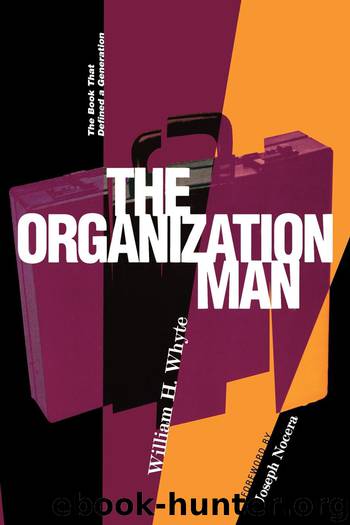The Organization Man by William H Whyte

Author:William H Whyte [Whyte, William H]
Language: eng
Format: epub
ISBN: 0812218191
Publisher: University of Pennsylvania Press, Inc.
Published: 0101-01-01T00:00:00+00:00
To some management people the desire to do “free” work is a downright defect—a symptom of maladjustment that demands cure, not coddling. When a man wants to follow his own hunch, they believe, this is a warning that he is not “company-oriented.” The solution? Indoctrination. In “Personnel Practices in Industrial Laboratories” (Personnel, May 1953) Lowell Steele puts the issue squarely. “Unless the firm wants to subsidize idle curiosity on the part of its scientists,” he says, “it must aid them in becoming ‘company-conscious.’” Company loyalty, in other words, is not only more important than idle curiosity; it helps prevent idle curiosity.
The administrators are perfectly correct. If they get scientists to be good company men like other normal people, they won’t be bothered much by scientists’ following their curiosity. The policy will keep out that kind of scientist. For what is the dominant characteristic of the outstanding scientist? Every study has shown that it is a fierce independence.
In her study of eminent scientists, psychologist Anne Roe found that what decided them on their career almost invariably was a college project in which they were given free rein to find things out for themselves, without direction, and once the joys of freedom were tasted, they never lost the appetite. The most important single factor in the making of a scientist, she concludes, is “the need and ability to develop personal independence to a high degree. The independence factor is emphasized by many other findings: the subjects’ preference for teachers who let them alone, their attitudes toward religion … their satisfaction in a career in which, for the most part, they follow their own interests without direction or interference.” (Scientific American, Nov. 1952.)
In the outstanding scientist, in short, we have almost the direct antithesis of the company-oriented man. If the company wants a first-rate man it must recognize that his allegiance must always be to his work. For him, organization can be only a vehicle. What he asks of it is not big money—significantly, Bell Labs and GE have not had to pay higher salaries than other research organizations to attract talent. Nor is it companionship, or belongingness. What he asks is the freedom to do what he wants to do.
For its part, The Organization can ask only so much in return. The Organization and he have come together because its long-range interests happen to run parallel with what he wants to do. It is in this, his work, that The Organization’s equity in him lies. Only one quid pro quo can it properly ask for the money that it gives him. It can ask that he work magnificently. It cannot ask that he love The Organization as well.
And what difference would it make if he did? The management man is confusing his own role with that of the scientist. To the management man such things as The Organization and human relations are at the heart of his job, and in unconscious analogy he assumes that the same thing applies to the scientist, if perhaps in lesser degree.
Download
This site does not store any files on its server. We only index and link to content provided by other sites. Please contact the content providers to delete copyright contents if any and email us, we'll remove relevant links or contents immediately.
| Ethics | Etiquette |
| Fashion & Image | Health & Stress |
| Motivation & Self-Improvement | Work Life Balance |
| Workplace Culture |
Tools of Titans by Timothy Ferriss(8354)
Change Your Questions, Change Your Life by Marilee Adams(7724)
Deep Work by Cal Newport(7045)
Playing to Win_ How Strategy Really Works by A.G. Lafley & Roger L. Martin(6192)
Man-made Catastrophes and Risk Information Concealment by Dmitry Chernov & Didier Sornette(5987)
Digital Minimalism by Cal Newport;(5742)
Big Magic: Creative Living Beyond Fear by Elizabeth Gilbert(5731)
The Slight Edge by Jeff Olson(5400)
Ego Is the Enemy by Ryan Holiday(5398)
The Motivation Myth by Jeff Haden(5195)
The Laws of Human Nature by Robert Greene(5144)
Stone's Rules by Roger Stone(5068)
Tuesdays with Morrie by Mitch Albom(4756)
Eat That Frog! by Brian Tracy(4503)
Rising Strong by Brene Brown(4435)
Skin in the Game by Nassim Nicholas Taleb(4228)
The Money Culture by Michael Lewis(4178)
Bullshit Jobs by David Graeber(4169)
Skin in the Game: Hidden Asymmetries in Daily Life by Nassim Nicholas Taleb(3983)
